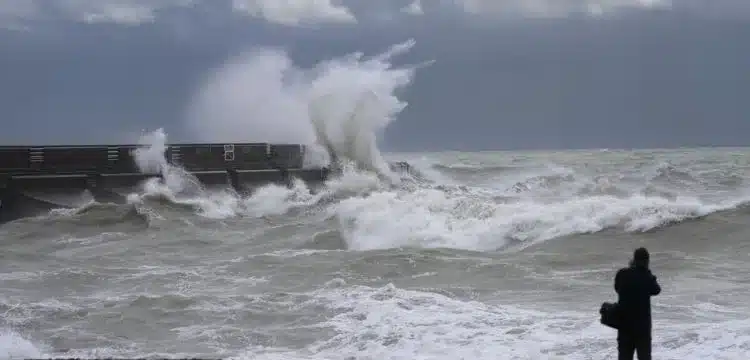[vc_row][vc_column][vc_column_text dp_text_size=”size-4″]
Storm Ciaran made a powerful impact on northwestern Europe on Thursday, bringing with it strong winds and heavy rainfall. Tragically, it claimed a life in France and led to the closure of schools, airports, and rail and ferry services. In the northeastern region of Paris, a truck driver lost his life due to a falling tree, and a staggering 1.2 million French households were left without electricity. The authorities in Finistere, Brittany, strongly advised people to remain indoors and avoid the extreme winds, which reached speeds of 207 kph and caused reports of 20-meter waves along the coast.
Storm Ciaran, closely following the previous Storm Babet by two weeks, was propelled by a powerful jet stream originating from the Atlantic, resulting in substantial rainfall and fierce winds. This severe weather had already caused significant flooding in Northern Ireland and parts of Britain.
Read more : Hong Kong on High Alert As Typhoon Koinu Prompts Second-Highest Storm Warning
Gerald Darmanin, France’s Interior Minister, reported on the social media network X that 1,315 individuals had to be relocated to campsites or shelters. In the city of Brest, Finistere, several houses were evacuated after a crane collapsed. Local prefect Alain Espinasse urged people to “stay at home.”
Thankfully, there were indications that the storm in France was beginning to subside, with Meteo France downgrading the wind alert from red to orange in Mache, Finistere, and Cotes d’Armor.
In Britain, the Channel Islands were among the hardest-hit areas, with reports of blown-in windows and a house roof being torn off in Jersey, prompting families to seek refuge in nearby hotels. Southern England also experienced significant disruptions, with the sea rescue charity urging people to avoid the coast and numerous school closures.
The UK’s Met Office issued a yellow warning for London and southeast England. Although Storm Ciaran was considered a “relatively typical” autumn storm, the Met Office noted that, under certain climate projections, the frequency and intensity of such storms during British winters might slightly increase.
The impact extended beyond France and the UK. Dutch Airline KLM had to cancel hundreds of flights to and from Amsterdam, and international trains between Amsterdam and Paris were also canceled, while shipping lanes in the southwest of the Netherlands were closed.
Spain’s state-run weather agency, AEMET, issued red warnings for the northern regions of Galicia and Cantabria, where waves as high as nine meters were expected. Strong winds were also recorded in La Pinilla, a ski resort north of Madrid, and Estaca de Bares in Galicia, with wind velocities exceeding 150 kilometers per hour. In Spain, 18 flights were canceled in various cities, following the cancellation of 21 flights the previous day.
[/vc_column_text][/vc_column][/vc_row]











